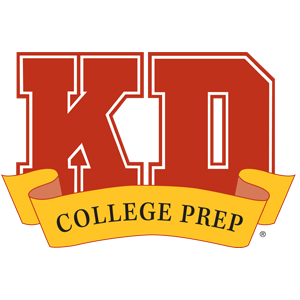You can take that four-leafed clover out of your pocket. With application numbers surging in recent years, we understand why students do everything they can to maximize their admissions odds. But families need to know that it takes a little more than luck to get into the perfect college.
Now that you’ve set your lucky charms and superstitions aside, it’s time to discuss what may actually tip the scales in your favor when it comes to getting accepted to a college. In this post, we explain how much luck plays a role in admissions decisions, plus we go over 15 tips for boosting your chances.
Is College Admissions Based On Luck?
Some misguided soul may have told you that luck is about all it comes down to when applying to competitive colleges. This is a common misconception, and it disregards the immense amount of work that driven students put into the college prep process. College admissions is not a lottery—your application won’t be selected at random. Admissions officers may only spend a few minutes going over your file, so it’s important to know how to stand out.
Strong grades, interesting extracurriculars, volunteer involvement, and great test scores are among the many factors that showcase a student’s academic potential. Competitive colleges want to accept students who will make the most of the opportunities presented to them. That’s why it’s important to do everything in your power to show them that you can be a world-changer.
15 Tips for Improving Your Admissions Odds
1. Know the Benchmarks for Choice Colleges
Every school has certain credentials that they look for in their applicants. These are especially important to note for schools or programs on your college wish list that are highly competitive.
As you begin the college prep process, you’ll want to know which colleges favor top-tier academic performance or community involvement, which schools offer automatic admittance and what the conditions are, the SAT® or ACT® score ranges of admitted students, essay requirements, and which schools require interviews or letters of recommendation.
Knowing the academic benchmarks of certain colleges allows you to tailor your prep process and create a college application that aligns with their standards, which in turn enhances your chances of acceptance.
2. Take Challenging Courses
Competitive universities seek students who have challenged themselves in high school. Colleges want to improve their graduation rate by admitting students who will be able to complete their demanding course loads. Taking advanced courses will show college admissions officers that you are able to thrive under high pressure and meet the stressful demands of their classes.
Colleges and specific degree programs list admissions requirements on their websites. Be sure to review these early on in your college prep process. For example, you don’t want to find out that a college requires high schoolers to take four years of the same foreign language when you’re filling out the application. By then it’s too late! Researching these requirements early on will help you plan better.
Furthermore, it’s important to recognize that some prestigious universities like Stanford or Ivy League colleges will expect students to go above and beyond. Read more about high school course requirements at selective colleges.
3. Maintain a Stellar GPA
Great test scores demonstrate academic rigor, but grades also play an important role in showing a student’s academic potential. Pairing your competitive test scores with a stellar GPA will position you with better odds of acceptance.
A consistent grade point average will show admissions officers that you have been a committed student throughout your entire high school career, not just on an important testing day.
Keep in mind that colleges take a holistic approach to reviewing applications. Maybe a student’s class rank isn’t in the top 10 percent, but he still has a 3.9 GPA. In another case, a student may have a 3.5 GPA because she took on a handful of advanced or dual-credit courses.
When reviewing a transcript, colleges will take all this into consideration, along with your high school profile. School profiles will showcase important details like your class size, student body characteristics, class offerings, grading system, etc.
4. Get Involved
While the pressures of school can be exhausting, it’s also important to find a passion outside of the classroom. A rabbit’s foot won’t be enough to earn that acceptance letter, and neither will good grades alone.
You’ve probably heard the term “well-rounded” used by either an admissions officer or your high school counselor. Well-rounded students are involved. They build relationships with other students and teachers. They’ve developed problem-solving and networking skills that only real-world experiences can teach you.
Extracurricular activities add depth to your college resume while also serving as a source of self-expression. Finding an outlet for exploring who you are outside of your schoolwork is good for you and your future. So go join the Spanish club, a tap-dancing team, or even a knitting club—do whatever sparks your interest and connects you with a group of students who share those passions. And remember to choose quality over quantity.
5. Make an Impact
Colleges look at more than just the numbers associated with your application. The perfect applicant is not only an exemplary student but also knows how to use his or her skills and knowledge to contribute to a “greater good.”
Where will you find your purpose? Start by picking a passion project and work to make measurable differences or volunteering at a local charity or non-profit organization. While it’s a bonus to have volunteer experience on one’s application, do not pick a cause purely because you think it will “look good” to admissions officers. Choose a cause that’s close to your heart. And if your community lacks an organization that aligns with your cause, don’t be afraid to improvise. Need some inspiration? Check out this story about a former KD student who started her own nonprofit.
6. Reach Your Highest Test Scores
As the world of college admissions testing continues to evolve, it’s more important than ever to find ways to stand out. Good test scores demonstrate your academic potential and can help push your application toward the “accepted” pile. KD College Prep offers personalized test preparation programs for the SAT®, ACT®, or PSAT tests to help you achieve your best possible scores.
7. Make the Most of Your Summer Breaks
Summer vacation is one of the most crucial times for a student. While you may be tempted to spend the summer relaxing by the pool, take advantage of your free three months to best prepare yourself for college applications.
Summer is the perfect time to create a business plan for your new nonprofit, pick up that hobby you’ve always wanted to start or rededicate yourself to a schedule of live-online or in-person KD test prep activities. The next time you’re tempted to take a trip to the pool, make sure to pack your KD curriculum book and some good reading material, along with your sunscreen. For more tips for how to work toward goals this summer, check out our Summer Bucket List for Teenagers.
8. Build Relationships with Teachers and School Counselors
Competitive universities like to see letters of recommendations from teachers or school counselors. Most Ivy League universities require three letters of recommendation, and other universities often require one at the minimum. These are best written by someone who can attest to your personal and academic merit.
Building meaningful and lasting relationships with teachers and school counselors will serve you well when you start asking for letters of recommendation, and so will timing. Be sure to ask your teacher or school counselor to write letters in the spring of your junior year, at the latest. You probably aren’t the only student asking for one, so remember to plan ahead in order to secure this important aspect of your college application.
9. Seek Leadership Opportunities
We already discussed the importance of volunteering and involving yourself in extracurriculars. Competitive schools want an applicant who has leadership qualities as well. While it’s important to volunteer and be involved, students who have started their own clubs and nonprofits, or held leadership roles within these clubs, usually have the upper hand.
If the Spanish club you joined last year is electing officers, run for president. If you write for the school newspaper, work to become the managing editor. If there’s an interest or hobby that is near and dear to your heart but you can’t find a way to get involved in it at your school, found your own club. Colleges look for students who are willing to innovate, coordinate, and work for what they want.
10. Demonstrate Interest
Before you submit your application, visit the campuses of your top schools, if possible. Not only will this help you determine if you could see yourself living there, but it will also help show your interest in the university.
If traveling is not an option, find ways to explore the university virtually. Keep in mind that most schools host virtual information sessions, and many offer virtual tours. If your school offers a college fair, be sure to attend. Making connections with college representatives will show your interest to the college, which could possibly factor into an admissions decision.
11. Hire a College Counselor
Applying to college is intimidating and time-consuming. College applications can be tedious and confusing, and some students do not have the bandwidth or confidence to navigate the admissions process alone.
Hiring a college counselor can be a saving grace for students who don’t know where to start on their applications or need specific guidance for how to stand out in the admissions process. College counselors can help you determine which schools would be the perfect match for you and how to enhance your chances of getting accepted to that school. At KD College Prep we offer college counseling programs to help students build their best college applications.
12. Get a Head Start on College Applications
The Common App opens on August 1st each year, but it’s often a good idea to start working on college applications before then. KD College Prep offers summer and fall sessions of the Apply Now! Boot Camp each year to help 12th graders get a head start on their applications and essays.
Additionally, many schools use similar essay prompts each year. It is never too early to begin working on the perfect essay that you can submit to several schools. Building a great college essay takes time, and it’s better to start early to avoid careless mistakes.
13. Write Powerful Essays
College application essays are a great place to give admissions officers an idea of who you are as a person. Start brainstorming unique ways to showcase your personality or look back on a memorable moment from your life.
When you’re ready to begin writing, take a deep breath and start typing. You can (and should) go back and revise (which is why we said to start early). Essay editing and feedback can be an important part of the process when done correctly. Students should view edits as an opportunity to improve rather than an indication of failure. For more guidance, don’t forget to check out these helpful tips for writing your best application essays!
14. Consider Applying Early
By applying early to your top college choice, you are demonstrating a deep interest in your dream school. It also often means you’ll find out about the school’s admissions decision as early as December of your senior year. If accepted, this means you can relax for the remainder of 12th grade and focus on other important pieces of your high school career, like finishing strong, going to prom, or planning your graduation celebration.
Please note: Choosing an early decision deadline can be binding, meaning you often have to attend if accepted. Be sure to read over the agreement for the college carefully before making this commitment.
15. FAFSA Form
Save your time spent looking for pots of gold at the ends of rainbows. Fill out the annual FAFSA form instead. The Free Application for Federal Student Aid determines whether a student is eligible for federal grants, scholarships, and federal low-interest student loans. The form, which takes under an hour to complete, analyzes a variety of factors to determine eligibility. This step reduces the costs associated with college for millions of families across the country. We suggest that every student apply with FAFSA every year, even if the cost of higher education is manageable for you.
Why leave your future up to chance?
In summary, it takes a lot more than good luck to get into your perfect school. College admissions experts estimate that students can spend 100 hours or more perfecting their college application. When you add test prep, schoolwork, extracurricular involvement, and community service to the mix, you can see that an enormous amount of hard work and time goes into earning that acceptance letter.
Don’t take your student’s future for granted. All great things in life must be earned, and an acceptance at a dream college is no different. At KD College Prep, we offer test prep programs and college counseling to help students find the time and structure to help them reach their college goals. Schedule a free consultation to learn more.
P.S. If it helps calm your nerves, we suggest not walking under any ladders, avoiding black cats, and keeping all umbrellas closed indoors during admissions season. You know, just to be safe.














































